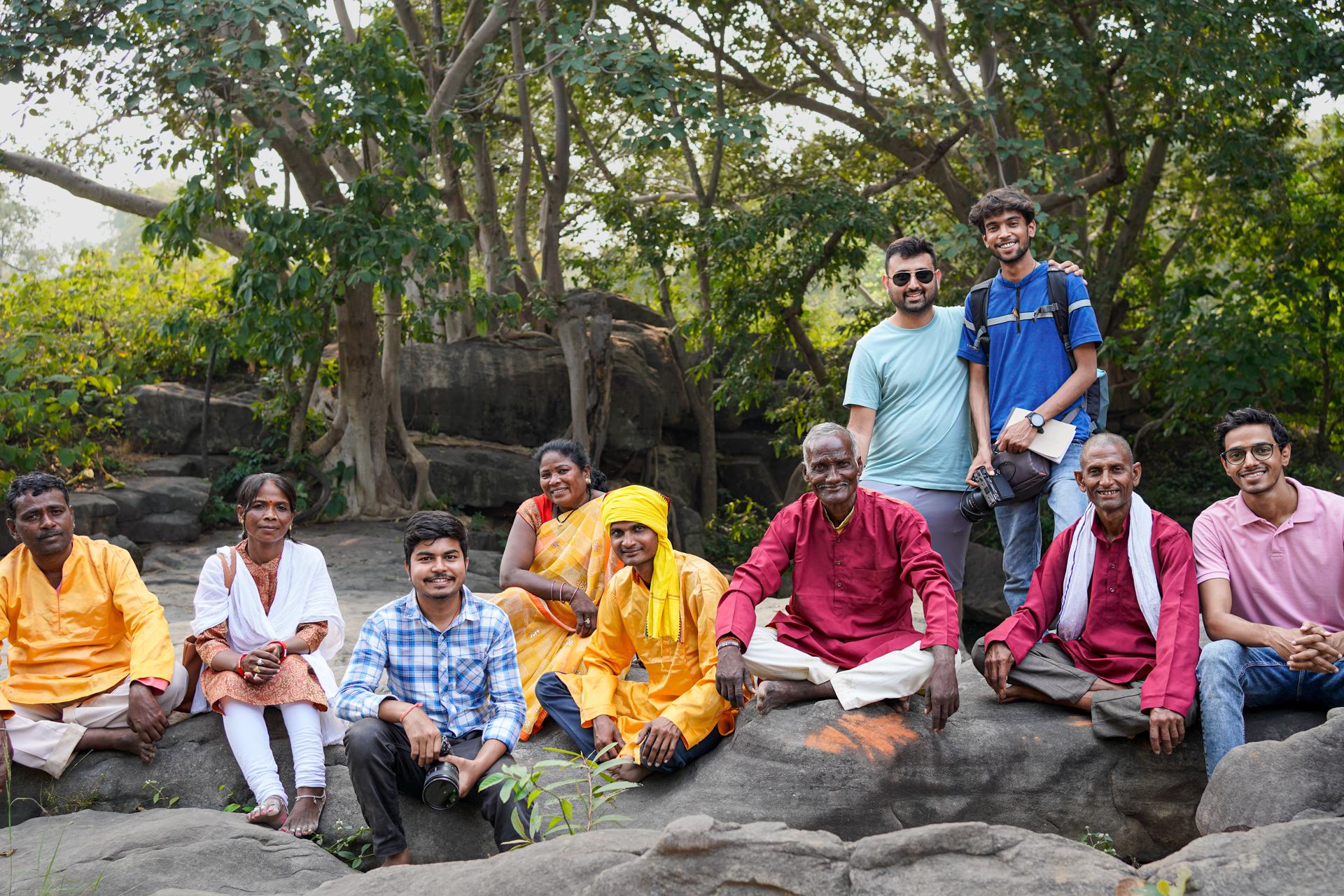
The Wedding Songs of the Kol Adivasis
The Kol Adivasis are one of the oldest tribal communities in India, and their folk songs are an important part of the cultural heritage of Uttar Pradesh.
Chitrakoot district of Uttar Pradesh is home to the Kol Adivasi tribe, one of the oldest and most well-known tribal communities in India. The Kol Adivasis are mentioned in the Ramayana and hence hold special significance in the religious milieu of North India. They also call themselves Chitrakoot vaasis, the inhabitants of Chitrakoot, and are deeply devoted to Lord Ram and Goddess Sita. Buti Bai and her group are Kol Advisasis and come from around Sarhat, a remote, backward village in the district. They perform the traditional folk songs of their tribe, which are an important intangible cultural asset of our country that preserves the lesser-known history and lives of this tribe.
Members of the group overcame many difficulties to perform at Markandey Ashram, an ancient, historical hermitage in Markundi town, that day. Difficulties are rather commonplace in the interior forest areas of the district, but nevertheless, a fascinating look into the lives of the people there. Buti Bai had to walk around 10 km to reach a bus stand to take the bus. Shyama Bai had a sick child to tend to at home, and the previous night was quite taxing on her as she struggled to find a doctor to get him treated. The poor network made it difficult for other members to coordinate the time and venue with each other. Nevertheless, they put up an energetic performance that afternoon, much to the delight of other devotees, who were taken by surprise with it.
The songs were composed in rustic, uneven tunes and accompanied by harmonium, dholak and jhika while Shyama Bai danced to them and showed us a glimpse of their traditional celebrations. The songs are sung at their weddings and other celebratory occasions and written in the dialect of the language they speak. Balma is a playful banter song between the husband and wife. The wife remarks about her life in her new household to her husband. The song, which is sung on the wedding night, celebrates the bride’s and groom’s excitement and nervousness as they enter the new phase of their lives and all the drama it comes with. Buti Bai sang this song alongside Sukhram, who also played the harmonium. Sukhram’s coarse, baritone voice added to the song’s appeal. Shyama Bai twirled to the song vigorously in rapture and joy, which was quite a sight to behold.
Kolhai and Sajnai are songs sung in Kol weddings as well, but on the night when the groom’s baraat is going to arrive. Both the songs are slower in temp than Balma, and the dancing is also slower paced. Buti Bai explained that the songs are usually sung all night, and everybody dances to them. Her ancestors sang these songs to brave the winters and survive the cold. The Kol people historically lived in acute poverty and didn’t own clothes to wear. As Buti Bai noted, the situation has changed a lot now, as the Kol people have homes and work on farms for their livelihood. In continuing the tradition of singing these songs, Buti believes they are keeping the history of their tribe alive and are teaching the coming generations about the difficulties that their ancestors have overcome.
Buti Bai is also a teacher and an activist, as well as a singer. She teaches Math and language at a primary school in her village. she is involved in an association that works towards the upliftment of Kol women. She solves cases related to domestic abuse, poverty and women deserted by their families. She is a single woman who lost her husband a few years back to an unknown illness and took a keen interest in the issues of her tribe and the women. She was also a member of the Zilla Gram Panchayat and has spent years fighting for the rights and justice of the tribe. She has even travelled abroad to raise awareness about her community’s issues. Alongside music, she is a playwright and writes on topics like domestic abuse and poverty in her region. She has staged Nukkad performances of her plays.
Other group members are also making a name for themselves and taking the Kol community to new heights. Shyama Devi is a member of the Akhil Bhartiya Samaj Sewa Sansthan, where she trained in different folk songs. She is also a teacher in the same organisation today, teaching about 36 students and taking the tradition forward. Kaushal Kishor is a graduate student from Allahabad who, at the young age of 22, already has 13 years of experience as a singer. He started learning from his father, Ram Kishor, a group member. Although he excels academically, he confidently expresses his ambition to be a singer and write his songs someday. Indeed, a bright future awaits him. Ram Kishor’s nephew, Sukhram, is also a group member. He plays the harmonium and is a singer too. His favourite genre is singing kirtans and bhajans dedicated to Ram-Sita. He is also a theatre artist, and he’d play the role of Vishwamitra in Ram-Leela nautankies.
Buti Bai was in a hurry after the performance, for she had to catch a train back home. In her brief time, she gave a glimpse of her life back home. Being a single woman who is also an activist, she has seen a lot of hardships in her life. Music is what keeps her going. Despite all the difficulties, it is important to appreciate the simple things in life, and music helps her do that. To be happy, no matter the circumstances, is the most important thing in life, according to her. Music enriches that happiness within us, and traditional folk songs are the best example of that.
